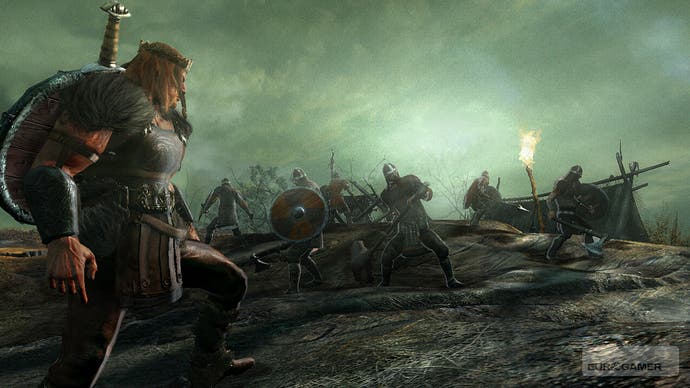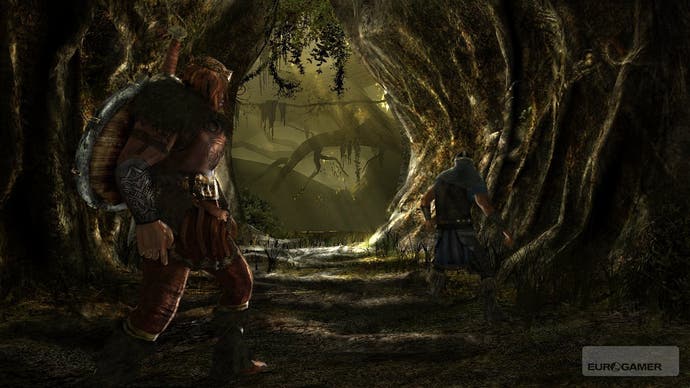Beowulf
Be Beowulf.
So, yes, Beowulf is a post-God-of-War fantasy game, with plentiful blood (it's as mature-rated as it is next-gen-only - that is, totally). But there's more to it than just taking everyone apart.
There are up to fifty people on screen, and you get to lead a number of them in a squad-management fashion. It's at this point that you may not be surprised that the team behind the game were last seen hard at work on Ghost Recon games. It initially seems quite the leap. "Vikings are the dark-age special forces!" laughs Lacey, "They're like marines. They had special chainmail." "It's a big leap between genres," Matouba continues more soberly, "but we thought if we can be the Rainbow Six of hackandslash it could be interesting."
Being a different genre, the squad control is simplified compared to a Rainbow Six, but the core value of close tactical control remains. "It's something you don't see very often in beat-'em-ups and hackandslash games," Matouba argues, "We thought it was quite a cool layer to add in then. You like to lose control, but at the same time order them to surround you, defend you."

The question of how much you lose control and how much you don't is a key question in Beowulf. If you concentrate on protecting your men, your heroism increases. Conversely, concentrate on the slaughter and your Carnal Rage climbs. Both lead to different abilities, but they have wider sweeping actions than that. In the manner of Fable, your preferences shape the kingdom itself. It's a key aspect of the thirty-years mid-game.
"Now that you have all power. The player has to decide what kind of King he'll be," says Matouba, "Will he be that Barbarian guy, or the Arthurian guy? We ask: What sort of player are you?". This choice decides what perils you'll face along the way. As the game progresses, there's a slow slide from the mythology of the early game to the more historical-themed problems of the latter, but this is altered with extra missions depending on your stance. If you're a good kind - with a good kingdom - expect Barbarian invaders to home in on your lands plenty. If you're a bad king, then you're stuck dealing with more dark mythic creatures. "Then you've got the hub, which gives you basic feedback on how your people are reacting. If you're being a good king: hurrahs. If you're a bad king: boos," adds Lacey.

It's interesting to note that the growth of Beowulf towards being a good king mirrors the increasing complexity of the soldier-controlling mechanics. The change in maturity also links to the ever-ageing Beowulf at its centre. "By seeing your own character ageing means there is an end. Everything relates to that," Matouba argues, "If you refuse to grow up and play the same button-bashing from the beginning the end...well, you have the right. But - man! - you haven't evolved. We're trying to give people tools that admit that, while button-bashing is a good thing, we can open the genre into something new. We try and give the player feedback to get from pure pleasure of button-bashing to being the commander."
That said, there are advantages to being Mr Bad. "It's cool too be a bastard!" grins Matouba. "It's great to be the man; to be 'I don't care'. You have the right to be just like that."
Beowulf is coming to the Xbox 360 and PlayStation 3 in November via Ubisoft.
